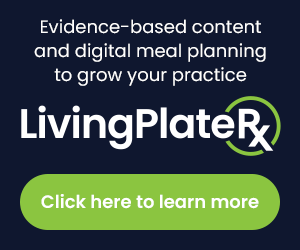▼ ADVERTISEMENT

|
Editor's E-Note
Skin Cancer and the Mediterranean Diet
What factors beyond UV radiation exposure contribute to the development of skin cancer? In this month’s E-News Exclusive, we explore the connection between nutrition and skin cancer. Just in time for Mediterranean Diet Month, we highlight findings that suggest adherence to the Med diet, among other factors, may help reduce one’s risk for certain types of skin cancer.
After reading the article, visit TD’s website at www.TodaysDietitian.com to read the digital edition of our May issue, featuring our nutritional psychiatry cover story on bipolar disorder. In addition, you’ll find features on dietary interventions for seasonal allergies and the role of the special instructor nutritionist in early intervention settings for children with developmental challenges. We are also excited to host our second round of Great Debates, this time centered on the topic of protein recommendations.
The TD staff wants to thank all the dietitians and other nutrition and health care professionals for attending our 12th annual Spring Symposium on May 4 through 7 in San Antonio. Offering a wide variety of educational sessions and workshops, special events, activities, and unique networking opportunities, the Symposium was a great success. We extend a special thanks to our presenters and sponsors for making this continuing education event so wonderful.
Please enjoy the E-Newsletter and give us your feedback at TDeditor@gvpub.com. Don’t forget to like us on Facebook and follow us on X, formerly known as Twitter.
— Heather Davis, MS, RDN, LDN, editor |
|
|
| In This E-Newsletter
|
|
 |
|
|
▼ ADVERTISEMENT

The Role of Nutrition in Skin Cancer
By Heather Davis, MS, RDN, LDN
As the weather warms, the days lengthen, and the UV index increases, we are reminded to reach for our sunscreen or protective clothing when spending a day outdoors. Most of the messaging we hear about skin cancer prevention tells us that focusing on these physical barriers is the best way to prevent skin cancer. Research shared by the Skin Cancer Foundation suggests that regular daily use of SPF 15 sunscreen, when used as directed, can reduce the risk of developing squamous cell carcinoma by about 40% and lower melanoma risk by 50%.1 However, nutrition may also have a part to play.
Nonmelanoma skin cancer (NMSC) is the most common cancer among Americans. NMSC tumorigenesis is a process unfolding over time, and damage from free radicals plays a role in the initiation of this process. The harmful effects of UV-induced oxidative stress at the level of the skin occur through multiple mechanisms that involve alterations to proteins and lipids, promotion of inflammation, immunosuppression, DNA damage, and activation of signaling pathways that affect gene transcription, proliferation, and apoptosis. Where DNA damage is concerned, reactive oxygen species (ROS) can oxidize DNA bases, particularly guanine, leading to the formation of lesions such as 8-oxo-deoxyguanine, which researchers classify as highly mutagenic. In addition, ROS-driven changes to lipids and proteins lead to abnormal cellular signaling, potentially promoting carcinogenesis. Oxidative stress can also lead to the synthesis and release of matrix metalloproteinases that degrade collagen and accelerate skin aging.2
With all this in mind, it’s not hard to see how supporting the body’s antioxidant defenses may help maintain healthy skin and reduce skin cancer risk, even in the presence of UV radiation.
▼ ADVERTISEMENT
 |
Plant-Based Foods Could Help People With Cardiometabolic Disorders Live Longer
People with cardiometabolic disorders—such as obesity, diabetes, and heart disease—could increase their chances of living longer by adopting a healthy plant-based diet, according to a study presented at the American College of Cardiology’s Annual Scientific Session.
While prior studies have assessed the benefits of plant-based diets in a general population, this new study is the first to focus on their benefits in people with cardiometabolic disorders, which are rising in prevalence worldwide and bring an increased risk of premature death.
“Among populations with cardiometabolic disorders, higher adherence to a healthful plant-based diet was significantly associated with a lower risk of total, cardiovascular, and cancer mortality,” says Zhangling Chen, MD, PhD, of the department of cardiovascular medicine at the Second Xiangya Hospital of Central South University in Changsha, China, and the study’s lead author. “More intake of healthy plant-based foods, less intake of unhealthy plant-based foods, and less intake of animal-based foods are all important.”
|
Home-Delivered Medical Meals Could Prevent Millions of Hospitalizations
A recent study suggests that providing home-delivered, medically tailored meals to individuals with chronic illnesses could prevent over 3.5 million hospitalizations annually in the United States, reports U.S. News. These meals, customized for conditions like diabetes, heart disease, and cancer, may improve health outcomes and reduce health care costs. Implementing these programs could be a cost-effective strategy to enhance patient care and alleviate strain on the health care system. |
CPE Monthly
Learn about the use of collagen as a supplement in the treatment of various health conditions and how RDs can educate patients on its therapeutic benefits in this month’s issue of Today’s Dietitian. Read the CPE Monthly article, take the 10-question online test at CE.TodaysDietitian.com/CPEmonthly, and earn two CPEUs!
2026 Spring Symposium
Registration for our 13th annual Spring Symposium is now open! Take advantage of $249 Early-Bird Registration and plan to join us in Orlando, Florida, from May 17–20, 2026. This premier event offers a full array of learning opportunities and features fitness activities, networking, and exploration of new products. Additional details are forthcoming.
|
Keep It Clean
That Clean Life is a meal-planning platform designed for nutritionists to create personalized, nutritious meal plans for clients. It offers a database of healthy recipes, automatic grocery lists, and nutritional breakdowns, making it easy to tailor plans for specific dietary needs. The platform can help streamline client management, save time, and provide evidence-based meal guidance for improved health outcomes. Learn more »
Gut Health Support
The FODMAP Friendly app is a tool for RDs working with clients managing IBS and other gastrointestinal issues. It provides access to a food list of certified low FODMAP products and portion guidance. With easy-to-use features and regularly updated listings, the app helps clients understand their meal plans better and personalizes gut health support based on food recommendations. The app is available on Android and iOS. Learn more » |
In the June/July Issue
• Staying Informed on Food Sensitivities
• Intuitive Eating in Bariatric Care
• SMASH the Omega-3 Gap |
|
|
COVER STORY
Nutritional Psychiatry & Bipolar Disorder
Bipolar disorder (BD) is more than mood swings; it’s a complex mental health condition that impacts energy, cognition, chronic disease risk, and many activities of daily life. Find out how nutrition support improves outcomes and quality of life.
FEATURE
Nutrition in Early Intervention
Early Intervention nutrition is a vital yet often overlooked field where RDs play a key role in supporting infants and toddlers with developmental delays. Learn how dietitians can help set the foundation for lifelong health and well-being by assessing needs, creating personalized plans, and guiding caregivers.
|
|
|
| Advertising Opportunities |
Have a product or service you want to market to nutrition professionals? Utilize the reach of Today’s Dietitian Magazine to accomplish your marketing goals. E-mail our experienced account executives today at sales@gvpub.com or call 800-278-4400 for more information.
|
| © 2025 Today’s Dietitian Magazine |
|
|